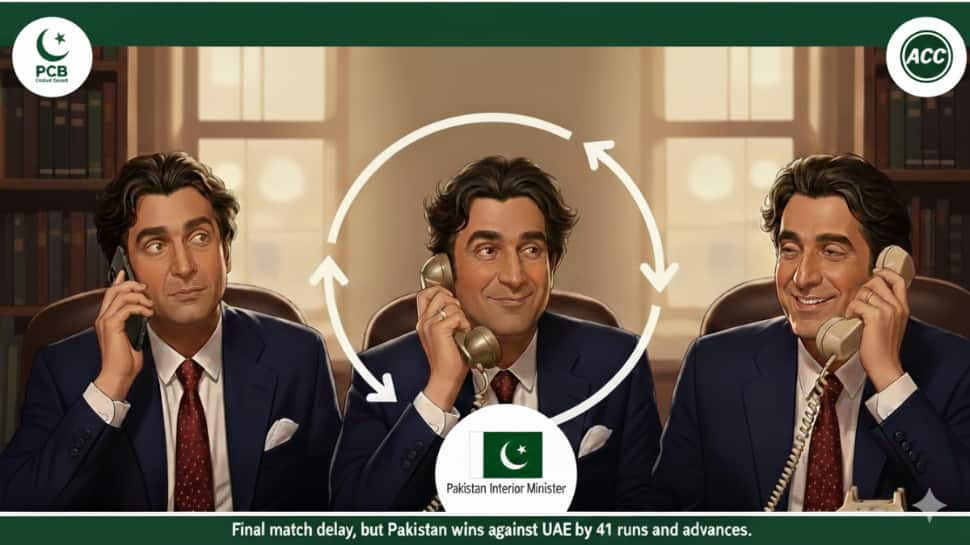How funny is this? Mohsin Naqvi, wearing multiple hats as Pakistan’s Interior Minister, Chairman of the Pakistan Cricket Board (PCB), and also the head of the Asian Cricket Council (ACC), found himself in the strange position of essentially calling himself. The same man leading the government, the board, and the continental body was caught in the middle of Pakistan’s boycott drama over their Asia Cup 2025 group-stage clash against the UAE.
It began with the PCB, headed by Naqvi, demanding that match referee Andy Pycroft to not officiate in Asia Cup 2025. Then came the Interior Minister ( again Naqvi) pushing for a boycott. Finally, the Asian Cricket Council chief (once more Naqvi) started investigating the issue. The irony was so glaring that this episode became another “funny chapter” in what many describe as Pakistan’s sinking cricket ship.
ALSO READ – MS Dhoni’s Hookah Room: Who Was In, Who Wasn’t?, Were Played Forced? Manoj Tiwary Spills the Beans
The Boycott Drama
After all the drama and theatrrics, Pakistan’s game against UAE did eventually go forward. But it was far from a smooth resolution, as the PCB, full of defiance and threats, was forced to accept the very same official it had opposed. The International Cricket Council (ICC) refused to bend, sticking to its position of protecting match officials from intimidation.
The PCB put forward its version that referee Andy Pycroft had apologised to Pakistan’s manager and captain before the delayed game on Wednesday (September 17). However, sources offered a counter-view, suggesting Pycroft merely clarified matters rather than issuing any outright apology. They described his words as an expression of regret over “miscommunication” in the September 14 handshake episode. Notably, the video released by the PCB showed no audio – raising further doubts over the claimed apology.
In the build-up, the ICC and PCB exchanged a series of emails, phone calls, and video discussions. The PCB had insisted that Pycroft be removed from the panel of referees, calling his expulsion a “non-negotiable condition” for their continued participation. Yet the ICC stood firm: not only did Pycroft remain, but he also officiated the very game against UAE.
ICC’s Firm Stand
The ICC clarified it was not simply a matter of changing one referee; it was about a principle. The world body said the protection of match officials’ independence was paramount. Umpires and referees, they stressed, must be allowed to perform their roles with impartiality and fairness, free from any intimidation by boards. Agreeing to Pakistan’s demand, they argued, would have set a dangerous precedent.
Importantly, the ICC also conducted its own inquiry into the episode. The verdict was clear: Pycroft had no case to answer. In formal communication part of at least three exchanges of mails with the PCB the governing body underlined there was no valid ground for replacement. At one point, a compromise suggestion came up: to drop Pycroft from Pakistan’s fixtures and bring in Richie Richardson. However, this too was rejected.
The dispute had first been reported by Cricbuzz on September 16, when the PCB’s demands became public. The ICC’s stance was that many of PCB’s grievances related more to tournament organisers in this case, the ACC than to Pycroft himself.
The Meetings and Counterclaims
Eventually, the PCB claimed that it had secured a moral victory. “The ICC has expressed its willingness to conduct an inquiry into the code of conduct violation that occurred during the September 14 match,” the PCB asserted in a statement. It also insisted that Andy Pycroft had apologised: “The ICC’s match referee, Andy Pycroft, apologized to the manager and captain of the Pakistan cricket team. Pycroft had barred the captains of India and Pakistan from shaking hands before the match, and the PCB strongly objected to his actions.”
Speaking in Lahore, Naqvi added: “This crisis has been going on since the match against India. We had an objection to Pycroft’s conduct. This matter was only solved after Pycroft apologised over miscommunication at the toss,” before further noting, “Cricket and politics cannot go together.”
On the field, Pakistan secured a 41-run win over UAE, qualifying for the Super 4 stage of the Asia Cup. Their next big test will be against India on September 21

